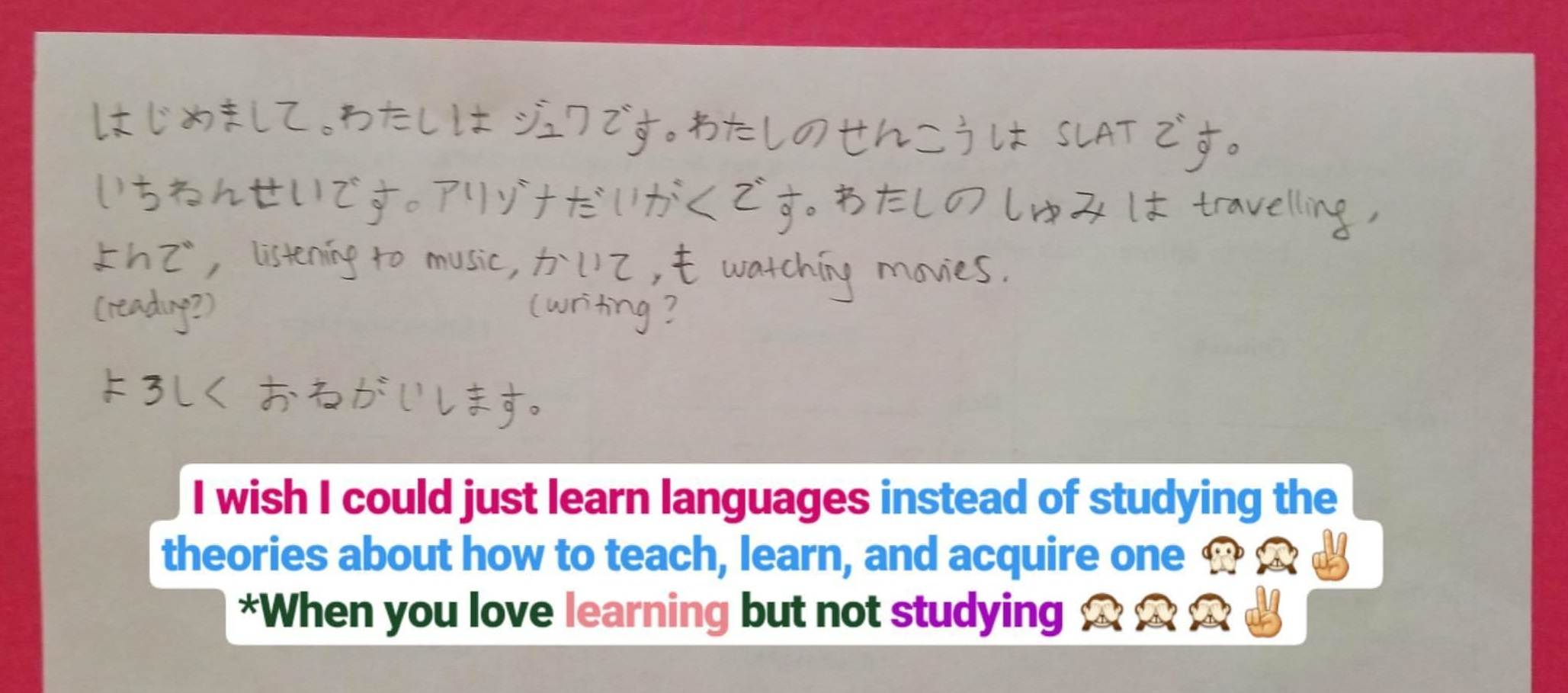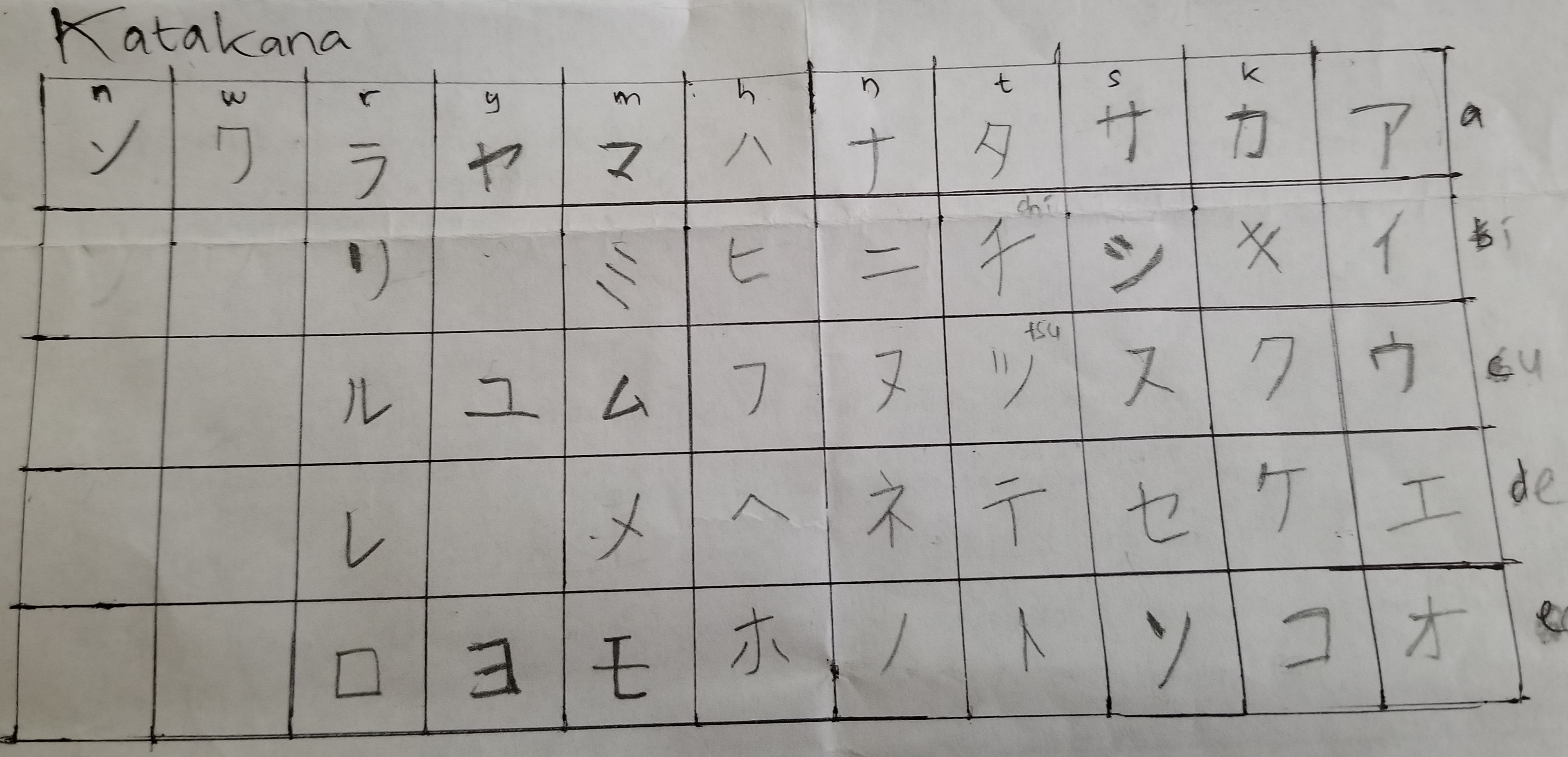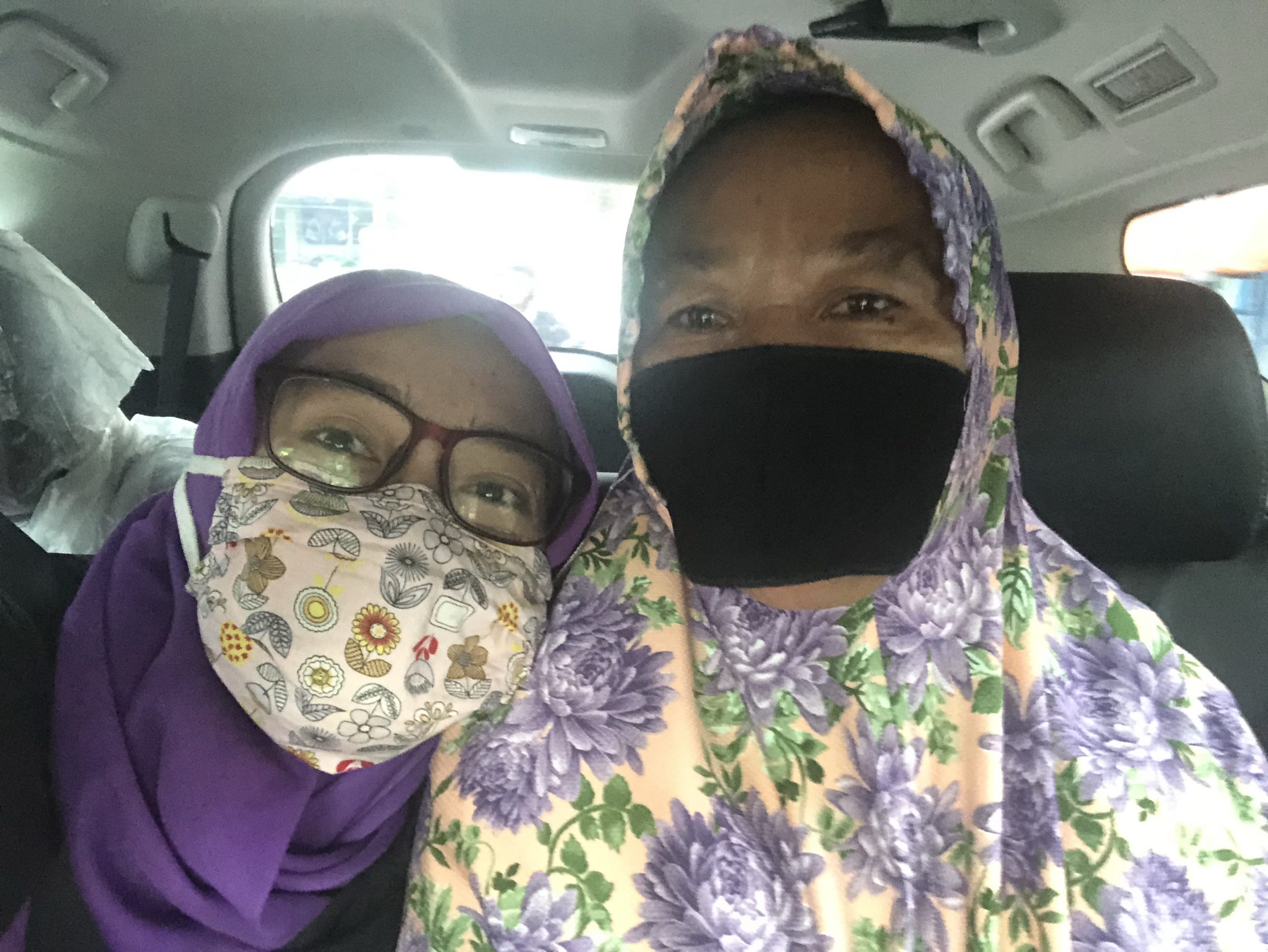Here are some other points that I observe from my auditing Japanese 101.
Learning the fifth language
So I’m learning Japanese as my fifth language. I learn this not via Bahasa Indonesia or my other first languages, but via English, my fourth language. (English can be considered my second/third language though, since I acquire my first three languages almost simultaneously). There is plus and minus with this. I mean, I can use both English and Bahasa Indonesia to help me learn Japanese. I can use the similarities found between Japanese and Bahasa Indonesia and the similarities between Japanese and English to help me understand Japanese. The minus point is, because I learn this via English, and I use my Bahasa Indonesia to understand English, so sometimes it takes me longer time to retrieve the Japanese words because I first need to go back and forth between English and Bahasa Indonesia. For example, we get to learn the Japanese words for “freshman, sophomore, junior, and senior.” In Bahasa Indonesia, we don’t have these, we simply say first-year, second-year, third-year, and fourth-year students. Thus, when the instruction was given in English, in which I have to say those words in Japanese, I first need to understand what freshman, sophomore, junior, etc. is. I have to remind myself that junior means third-year to finally be able to say junior or third-year in Japanese. Otherwise, I won’t be able to say it. I imagine, if I learn it through Bahasa Indonesia, it might have been easier and I could retrieve the words faster. The route would be shorter for I only need to understand third-year in Bahasa and translate it to third-year in Japanese. But since I learn it via English, the route is longer: from junior in English to third-year in English/Bahasa Indonesia before finally to third-year in Japanese. Well, I’m not sure if I’m being clear, but it’s like that. But again, because Japanese is a “language of sound”, for which we use Katakana instead of Hiragana, it gets even harder because they write it based on English pronunciation. So first, I have to figure out how it is pronounced in English before finally being able to write it in Japanese using Katakana. Man, it’s kinda frustrating 🙈🙈

Don’t miss a class!
This was actually first said by my Chemistry teacher in senior high school. He said, “You can miss the test and take it another day but you can’t miss the class for you will miss the explanation and even if I get to re-explain it, you might not understand it the same.” And I think I have believed and told my students the same thing. And now I experience this myself. First, I hardly skip any classes. I always come to my classes no matter how boring they are, except if I have emergency like Friday last week. Long story short, I could not come to the class for I had to go to Los Angeles to renew my passport (more on this when I can make time
to write about it later). So, well, the next Monday, I felt so left behind. Apparently, we started learning Katakana on that day, and so I had to learn it myself at home. I should learn the materials for Friday and for Monday in marathon, and it’s not good. Learning is not supposed to be like that. And the next Monday, we had another quiz on it, so you can imagine how messed up I was, and how hard I tried to catch up. Well, yeah I got 100 for the quiz on that Monday, still. I felt like I had to work much harder just because I missed one class on Friday. But yeah, learning in a class especially for language learning is important for me because we can practice there, we can concentrate there, and we have the teachers and the friends to help us understand there. Plus, we have the learning atmosphere, which is not the same as studying alone at home. Thus, skipping or missing one class is definitely a nightmare.

New Seat Arrangement
When I went to the class on Monday, I went ahead to where I usually sat. Then this girl approached me and said that it was her seat, I was like, “???” Then she explained that we had new seat arrangement starting last Friday, after we finished Chapter 1 on Thursday. She says that we’ll keep changing our seats as we finish each chapter. Well, ok, so where do I sit? I didn’t know so she just said that I could take the seat next to the door, which seemingly hadn’t been assigned to any student. Well, ok. I don’t mind. But then the teacher came and it seemed that another student was absent on the same day I was absent. He asked where he should sit and so I asked the teacher the same. And guess what? I was assigned to sit on the front row!!! Gosh, I don’t like sitting in the front row. It’s never been my favorite! I can’t observe the class. I can’t see everyone. Can I bargain? ☹ I felt like telling the teachers about it but I’d feel bad for everybody seems okay with it and I don’t want to request special treatment either, so I just sucked it up and sat where they wanted me to sit ☹ But the good thing is, the next day I found out that I got to sit next to this guy that looked like one of my favorite YouTuber. You know Kurt Hugo Schneider? Well, he kinda looks like him! And so I’m now happy with the new seat arrangement. It feels like sitting next to my idol. Haha 🙊🙈😂😂😂✌✌ (Gosh, I hope nobody in the class read this. This is embarrassing. Haha)
Anyway, I was surprised though that everyone just complied with the new seat arrangement. I can’t help but imagine doing the same thing with “rebellious” students, you know, the kinds who just wouldn’t abide by the rules? I don’t think they will sit where they are assigned to sit. They’ll just sit wherever they like, and the purpose of this new seat arrangement as in having new “angle” and “partner to practice” won’t be achieved. But this class is amazing. We have this “mutual trust”, which is important in teaching and learning. The teachers trust that the students will comply and understand why they do what they are doing. The students trust that the teachers do it for their own good. So, well, I think we need to make both teachers and students understand the importance of having such trust. When you don’t trust your teachers, it’s hard for them to do things for the class. When you don’t trust your students, it will be hard, too, for both of you.
Well, I guess that’s it. I can’t make much time to write nowadays. My required courses are driving me crazy. But I hope, whether you’re a student or a teacher, you can learn from my experiences. You can, definitely, share your experiences, too 😊
PS: Last Monday, Feb 5, 2018, we had a quiz on a new structure we learned, in which we had to write “mo” to substitute “wa” to mean “also/too”. Alas, I wrote “mo” in Katakana 🤦 I was supposed to write the Hiragana version 🙈 Well, that’s because before that, we had a quiz on Katakana, so I was still in Katakana mode. LoL *Not a good excuse, but I still need it to make myself feel better 🙊🙈🤣😂😅✌

